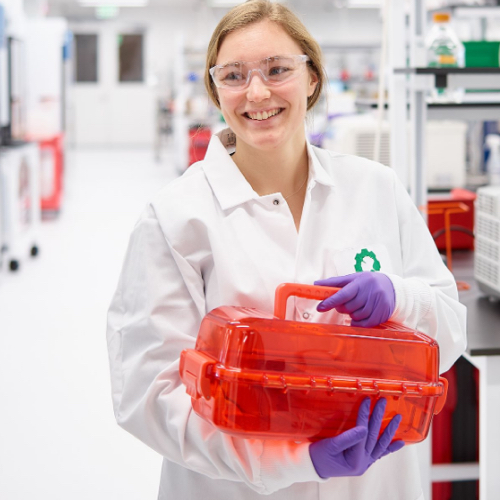Today, we’re excited to announce the launch of our Antibody Developability Product, an offering that pushes the envelope of biological data generation, designed to accelerate biologics development by providing high-quality, AI-ready data at an unprecedented scale.
Antibody therapeutics have transformed modern medicine, offering targeted treatments for a wide range of diseases. However, developing these complex molecules into safe, effective, and manufacturable drugs remains a significant hurdle. The journey from discovery to a clinic-ready and market-ready antibody involves navigating a complex landscape of biophysical characteristics—such as stability, aggregation, and solubility—that can make or break a drug candidate.
The Challenge of Antibody Developability
Antibody developability refers to the favorability of an antibody to become a viable therapeutic. It involves optimizing multiple physicochemical and biological attributes that are critical for potency, manufacturability, storage, delivery, and cost-effectiveness. Although acceptable parameter limits are well established, assessing these attributes has, for too long, been a bottleneck in drug development due to the manual and time-consuming nature of the required assays.
For this reason, developability assessments often occur late in the drug candidate selection process and involve only a limited number of antibodies. This narrow focus increases the risk of advancing molecules with hidden liabilities, leading to late-stage failures, costly redesigns, or even project terminations. Even with the rise of AI, the slow pace and limited throughput of traditional assays have made it difficult to generate large datasets necessary for predictive modeling.
Ginkgo’s High-Throughput Breakthrough
At Ginkgo Bioworks, our mission is to make biology easier to engineer. We announced Ginkgo Datapoints earlier this year to make generating data for your AI models easy, first for functional genomics and now for antibody developability.
Here’s how we did it: leveraging our expertise in high-throughput screening and automation, we’ve built a platform capable of producing and testing thousands of Immunoglobulin G (IgG) antibodies and other binder classes using a panel of the most commonly used developability assays in the industry. Our platform not only accelerates the generation of critical data but also ensures it’s seamlessly pulled and merged from multiple instruments, formatted, and ready for AI/ML model training or validation.
We want to give you a glimpse of what it would be like having these data and metadata in hand. That’s why we’re making a representative sample dataset consisting of commercially approved or clinical stage antibodies available to access yourself, right now. If you are interested in the full 200+ mAb dataset, or are looking for your own custom data, send us a request.
We’re ready to go much, much bigger and are currently booking runs with partners that are orders of magnitude larger, in the multiple thousands. And we don’t think we’re going to stop there.
Get started now on our website or via email
Our high-throughput assays include:
- Titer Measurement: Determining antibody concentration using Valita™ assays.
- Thermostability Assessment: Evaluating thermal unfolding and stability with nano Differential Scanning Fluorimetry (nanoDSF).
- Aggregation Analysis: Detecting antibody aggregation through Size-Exclusion High-Performance Liquid Chromatography (SE-HPLC).
- Colloidal Stability Testing: Examining molecular interactions in solution using Standup Monolayer Adsorption Chromatography (SMAC-HPLC).
- Hydrophobicity Profiling: Analyzing surface hydrophobic regions via Hydrophobic Interaction HPLC (HI-HPLC).
- Self-Association Measurement: Assessing tendencies of antibodies to self-associate using Affinity-Capture Self-Interaction Nanoparticle Spectroscopy (AC-SINS).
- Polyspecificity Screening: Testing non-specific binding against ovalbumin through Polyspecificity Particle (PSP) assays.
- Clearance Prediction: Estimating antibody half-life and clearance rates with FcRn binding assays.
By automating and scaling these assays, we’ve transformed a traditionally slow and limited process into one that rapidly produces rich datasets. We also continue to add additional assays to our menu of options, and can customize the right analytical package for you.
Unlocking the Power of AI in Biologics
We believe our extensive dataset is more than just an initial proof-of-concept—we believe this scaled approach is the key to unlocking artificial intelligence’s potential in biologics. With well-characterized antibodies and comprehensive data, researchers can now:
- Train Robust Models: Develop AI and machine learning models capable of accurately predicting developability attributes from protein sequences.
- Validate Existing Models: Use our dataset as a benchmark to test and improve current predictive models.
- Accelerate Candidate Selection: Identify promising antibodies earlier in the development process, reducing time and costs associated with late-stage failures.
We believe that antibody developability is an area where AI can make a significant impact—if only we can bring enough high-quality data to bear. These are, after all, measurements of highly conserved features of these proteins. We expect generalizable predictive principles to fall out of sufficiently large datasets, which means we have a potential to crack this code for the industry and move on to other challenges for translating discoveries into treatments.
Looking Ahead: Beyond IgGs
While our current focus is on IgG antibodies, our vision doesn’t stop there. We’re expanding our platform to accommodate other antibody formats, including single-domain antibodies (VHHs), bispecifics, and multispecifics. Our aim is to become the developability data generation platform for any antibody format, empowering the entire industry to innovate more efficiently.
Join us: if you’re interested in generating enormous amounts of rich, high-quality antibody developability data in an easily usable format, we’d love to help. We’ll be presenting at CCD-Biologics tomorrow and are happy to find time to chat at the conference or online.
